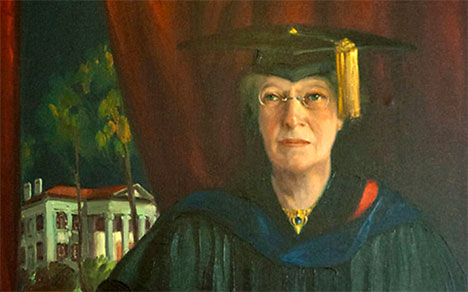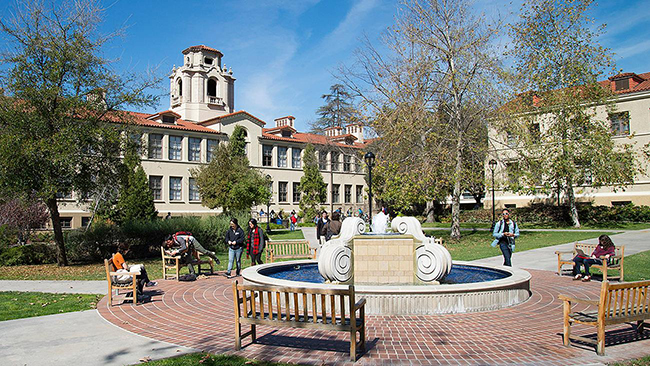COURIER Archives: Phebe outshone them all

by Judy Wright
Charles Burt Sumner, Frank Brackett, Edwin C. Norton, Phebe Estelle Spalding, Arthur Dart Bissell, Herbert Colcord, George Hitchcock and George Sumner were the pioneer faculty members at Pomona College. They are called The Old Guard.
Phebe was the only woman among them and the first woman on the Pomona faculty. Her recognition has often come because she was a “first” but she was probably the most accomplished faculty member among The Old Guard. All of the clerical faculty—Sumner, Norton, and Colcord—had some graduate education in schools of theology. Norton received a PhD at Carlton College, one of six ever granted by the liberal arts undergraduate college and during a transitional period for the college in 1896.
While the aim of the founding trustees may have been to appoint practicing clerics as well as academics for a new Christian college, it is clear that Hitchcock, Brackett, Bissell and George Sumner came from other disciplines.
Hitchcock and Brackett received honorary doctorates from their alma maters, and Brackett an additional honorary DSc from Pomona in 1947, bu
Phebe, after a year’s sabbatical in Britain studying Wordsworth, several stays in Minnesota studying and writing, received her master’s degree from Carleton in 1900. After work at Harvard University Library and The British Museum, she received a PhD from Boston University in 1908. Her dissertation was on the historical plays of Shakespeare.
The available records indicate that Phebe was the most published of the Old Guard. With the exception of Bissell and George Sumner, each with two publications, including their PhD dissertations, Phebe was the only member of the Old Guard to write professional publications.
Although no professional publications are found for Charles Burt Sumner, he did write a wonderful history titled The Story of Pomona College. Frank Brackett wrote two history books—History of Pomona Valley and one on Pomona College, Granite and Sagebrush.
In addition to many published poems and articles in professional journals, Phebe wrote 13 books and novellas, including A Tale of Indian Hill, 1899; Womanhood in Art, 1906; Through Nature to Eternity, A Shakespearian Meditation, 1933; and Patron Saints of California, published as five separate books in 1934.
Phebe’s scholarly accomplishments were unchallenged. Indeed, everyone who wrote about her wrote of her intelligence and education.
Her colleague, Edwin Norton, wrote, “She was an inspiring teacher and a constantly growing student. Many invitations came to her to lecture on [her] subjects and by her public work she added greatly to the widening influence of the college.”
In 1911 Pomona President Blaisdell announced the establishment of two professorships or chairs, “one to honor Dean Norton, the other to honor Professor Spalding.” These were the first of many endowed chairs for Pomona. Phebe was pleased that family and friends had agreed to donate to the chaired professorship that was named for her and that she occupied.
Martha Hathaway and the rest of the Bixby family led the way with contributions. The Phebe Estelle Spalding professors of English partially supported by the fund included: Phebe Estelle Spalding 1911-37; Elliott Curtis Lincoln 1947-49; Harold Davis 1949-59; Ernest Albert Strathmann 1959-62; Frederick Ludwig Mulhauser 1962-74; Charles S. Holmes 1974-76; Thomas C. Pinney 1984-97; and Martha Andresen 1997-2006.
Notwithstanding Phebe’s writings and scholarship, there was enough in her life to make her a feminist. Ever since she was 16 and began teaching, she had suffered discrimination with regard to the salaries paid to her, relative to her male colleagues.
When she came to Pomona College, for instance, she was paid $400 per year while her male counterparts, Brackett and Norton, were paid $1,000 and $1,300 respectively. As her career progressed, she had a more difficult time supporting herself.
When she wanted to build her house on Harrison Avenue in 1902, for example, she had to borrow all of the money and when she traveled to Europe and the eastern United States, she could do so only because of the generosity of Martha Hathaway, who provided a stipend for travel. It troubled Phebe that Pomona College did not have a fund for faculty travel, let alone pay her the same as her colleagues.
Led by new president Blaisdell, the Pomona College board of trustees decided in 1910—nearly 21years after Phebe’s arrival—“that Miss Spalding’s salary for the present be $1,500 and in the future be fixed irrespective of sex.”
By 1912, she had finally caught up with Brackett at $1,800 and at retirement in 1927 she was given a stipend of $2,000 per year.










0 Comments